10 Tips to Avoid the Flu This Winter
How can you avoid the flu this winter when those around you are coughing and sneezing? What can you do to help yourself get over it quickly?
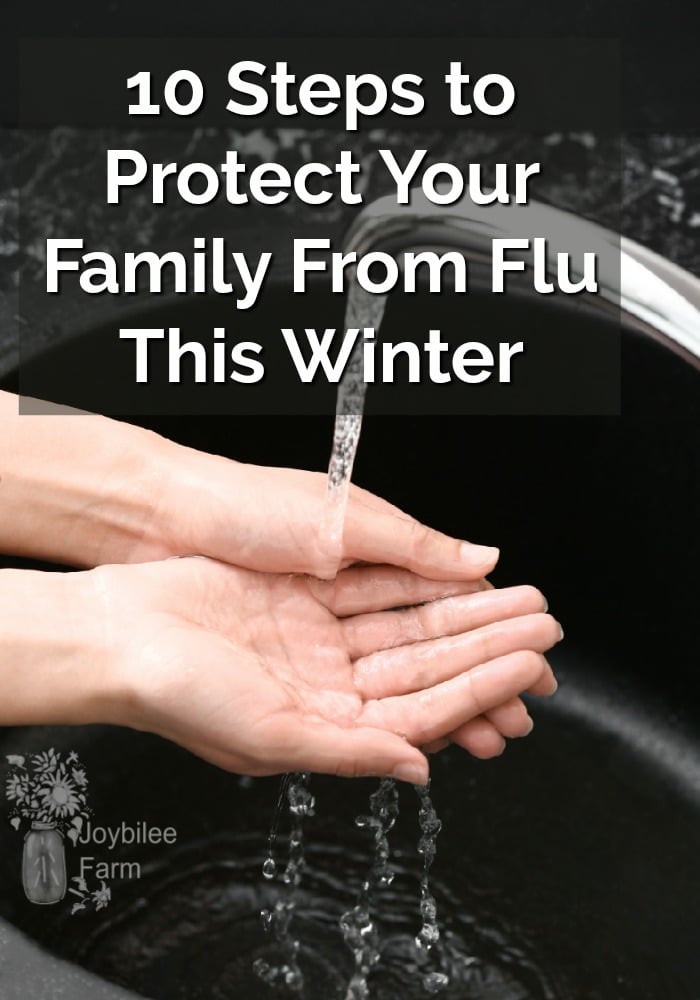
It’s chicken soup season. Living rural means that you need to take your health into your own hands. How can you keep from getting sick when those around you are coughing and sneezing? And what can you do when you need to get over it quickly — other people are depending on you.
People around me are getting the flu and colds, already this winter. In this serious economic climate, when you want to avoid going to the doctor, there are a few things you can do to ensure that you and your family stay healthy this winter.
1. Take vitamin D to help Avoid the Flu
Colds and flu are a symptom of vitamin D deficiency. If you find yourself feeling under the weather, start taking vitamin D. In Canada, October 15th is national vitamin D day, the day the federal government recommends that every person in the nation begin to take a vitamin D supplement. What dose? Dr. Mercola recommends 8,000 IU of vitamin D3 per day. In Canada, the assumption is that everyone is deficient so just start taking it. Vitamin D is not bio-available in food. Although it is added to milk, the form of vitamin D added to milk is usually D2 which is not bio-available for your body to use.
Vitamin D is produced by your skin when your skin is exposed to UVB rays from the sun. These are the rays that come to you when the sun is directly overhead. The damaging UVA rays come when the sun is slanted — like the sun coming through the windows of your house, or when the sun clings to the Southern part of the sky in winter if you are in the Northern Hemisphere. If you spend most of your time indoors or during winter you will need a vitamin D supplement to stay healthy.
Taking a vitamin D supplement will ensure that you get the protection you need. Vitamin D also helps with depression, like SAD, protects against cancer, and helps you lose weight. If you want to know more check out Dr. Mercola’s well-researched page, linked above.
2. If you get sick take Oil of Oregano
Last winter, I was sick for 2 months. I was coughing so much I couldn’t sleep and I was coughing up blood. It’s not easy going to the doctor when you live rurally so I put it off. I rested, wove cloth and stayed warm. My friend Evelyn insisted I take Oil of Oregano. The same day, another friend Liz made the same recommendation. I went to the health food store and picked up a bottle — it’s pretty expensive $30 for 50 ml — but cheaper than antibiotics. Within 24 hours of starting on Oil of Oregano, the coughing had stopped. And within a week I was well.
Oil of Oregano is a miracle during cold and flu season. Put just 5 drops under your tongue and hold it in your mouth for a few seconds. Swallow it down with 1/2 a cup of cold water. Oil of Oregano cleans the body of viruses and bacteria, especially in the mouth, nose and lungs.
Oil of Oregano tastes hot and will leave a taste in your mouth of pizza, but that’s a small inconvenience to pay for its healing power. We use it here for baby goats and lambs that are sick, too. The animals know it’s good for them and a baby being treated will start licking his lips as soon as he smells the oregano.
If you don’t have any oil of oregano handy, make a tea of oregano, thyme, sage, and rosemary and drink it with a bit of honey, at the first sign of a cold or flu. These aromatic spices will cleanse your mucus membranes, too, although not as powerful as the oil of oregano.
3. Take vitamin C to help Avoid the Flu
2,000 mg — 3 times a day to strengthen your immune system if you get sick. Or make a strong tea of rosehips and drink it down 3 times a day.
4. Cook with onions and garlic to help Avoid the Flu
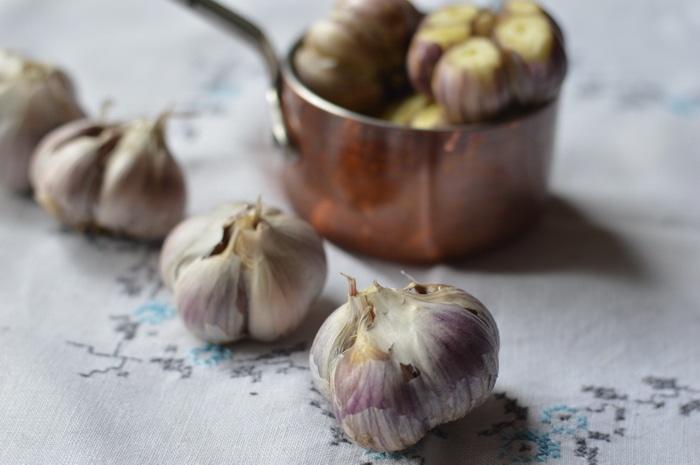
Chicken soup anyone? The secret ingredient in chicken soup is herbs, onions and garlic. Onions and garlic are immune boosters. The sulphur purifies your blood and strengthens your liver and kidneys. The warm steam and natural saturated fat in the chicken soup also help your body heal. Grow your own garlic and you will always have some on hand in the winter. As a homesteader, you can grow your own chicken, too.
5. Wash your hands with real soap to help Avoid the Flu
Forget the antibacterial gels and the waterless soap. They don’t work. At best they kill off both the good bacteria and the weaker harmful bacteria on your skin surface. At worse they allow harmful, antibiotic-resistant bacteria to proliferate on your skin surface.
Plain soap and water is the most effective way to clean your hands of harmful bacteria, viruses, and dirt. Using a detergent bar for frequent hand washing, rather than natural soap, can damage your skin and make you more susceptible to infection. Detergents denature protein and cause dryness, chapping and cracked skin. Instead using natural soap, will not dry your skin. Goats milk soap is super fatted and actually moisturizes your skin while it cleans.
6. Protect your skin from cracks and dryness
Dry, cracked skin allows bacteria and viruses to breach the skin barrier and enter your body. It’s hard to heal your skin after it cracks. Prevent cracking with moisturizing balms, anti-microbial ointments, and by using natural soap rather than harsh detergent soaps or antibacterial gel.
Avoid using petroleum-based or chemical-based moisturizers on cracked skin. These are carcinogens and will cause further damage.
Joybilee Farm Hemp Rescue Remedy is the ideal skin healer if you already have cracked skin.
Natural organic oils like organic extra virgin olive oil and organic coconut oil can also relieve dry skin in winter. Both of these oils are part of the mixture in Joybilee Farm’s healing balms.
7. Have steam in your home if you heat it with wood
Steam protects your lungs and nasal passages from dryness and cracking.
8. Wear wool
Wool keeps your body warm and wicks moisture away from your body keeping you dry. It is naturally antibacterial, too. Just can’t seem to get warm? Wear wool socks and put a wool shawl around your shoulders and you’ll be amazed at how fast you begin to feel warmer. Allergic to wool? Cashmere, silk and mohair will give you the same benefits. Avoid wearing synthetics next to your skin. Your skin is your largest organ. Man-made fibres are made from chemicals and plastics that will harm your endocrine balance, weakening your body’s immune defences.
9. Sleep with a scarf
If you get a sore throat, wrap a wool scarf around your neck before bed, and put on a nightcap. Keeping your head and neck warm will keep the blood flow to your head and neck, allowing your own immune system to flush away the virus.
10. Use herbs and Essential oils to help fight a cold or the flu
Eucalyptus, lavender and tea tree essential oils which are naturally antibacterial can boost your body’s ability to fight infection. Rub eucalyptus on your chest and on the outside of your throat if you have a cough or trouble breathing. Rub a drop or two of lavender on your temples or on your nose for stuffiness or a headache. Tea tree is a natural antibiotic, put a drop in warm water to gargle, brush your teeth and tongue with it. And don’t forget to drink flax jelly for a sore throat.
Elderberry can stop viruses from replicating in your body, increasing your body’s natural defences. Make an easy elderberry syrup that’s effective and safe for everyone in your family.
This safe and effective immune-boosting elixir. Make some and keep it on hand.
Make some Fire Cider and drink it liberally to support your wellness.
Bonus: Wash your hands to help Avoid the Flu
I already said it but I’ll say it again. Wash your hands. That’s how you prevent infection. You are out shaking hands, touching doorknobs, holding shopping cart handles. When you are out use this antimicrobial hand sanitizer that is gentler on your skin than the commercial products. But when you get home, make washing your hands the first thing you do when you walk into the house. And use natural soap, not antibacterial gels, or synthetic detergents. Protecting your body with natural soaps and organic vegetable oil moisturizers will help it do its job to keep you healthy.
Although there are many things you can do to prevent getting the flu or a cold. And a few herbal preparations that will help you if you do start to get symptoms, if you or a loved one has any of the following, see your doctor:
- difficulty breathing
- Chest pain
- coughing up blood
- high fever
- vomiting, diarrhea that you can’t control
- dehydration
- delirium
Be well this winter!
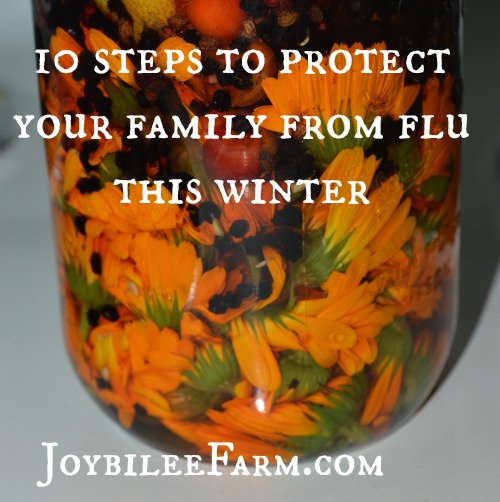
Your turn:
Tell me how you avoid getting the cold or the flu or give me your favourite home remedy during cold and flu season in the comments. Have a secret ingredient in your chicken soup recipe? Thanks for sharing.
Learn more about using herbs for health and wellness from my Book
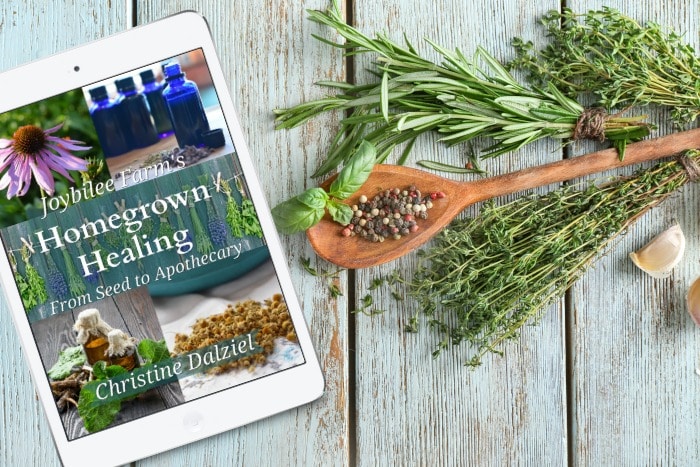
Homegrown Healing From Seed to Apothecary
My book Homegrown Healing From Seed to Apothecary will help you grow healing herbs in your own garden. Focusing on the easiest plants for beginners to grow, Homegrown Healing From Seed to Apothecary covers 30 plants, recommended by professional herbalists, that can be grown in the temperate zone. Initial garden preparation, garden design and harvesting tips lead the novice herbalist into early success. Choose which herbs to grow, learn how to use these herbs for your family’s health and wellness using the guidance in my book. You can find out more about this useful guide to growing more herbs and using them strategically here.


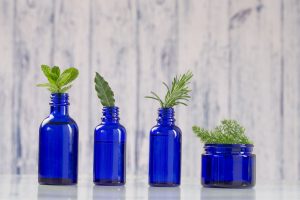



Don’t forget REST. Adequate and good sleep allows the body to rejuvenate and keep immune system at full function. I never underestimate the power of homemade chicken soup either 🙂
I’ve been a strong believer in oregano oil for years, since my husband and I bought a $200 bottle of it to treat our cows’ mastitis. It’s the only thing that worked, and it worked almost immediately. We had a few very sick cows at once, and were desperate to find a cure. Antibiotics seemed to be making things worse, not better. He bought this stuff…I can’t remember now what it was called but I know we can get it again if needed. Thankfully we don’t need it, and haven’t since. We stopped using antibiotics after that incident, and our herd has been perfectly healthy since.
Oregano oil, not antibiotics! Every time. 🙂